|
|
|
Sort Order |
|
|
|
Items / Page
|
|
|
|
|
|
|
| Srl | Item |
| 1 |
ID:
124415
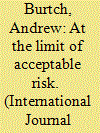

|
|
|
|
|
| Publication |
2013.
|
| Summary/Abstract |
Canada's first fighting season in Kandahar was traumatic. More than 40 soldiers were killed and several hundred injured. The unexpected strength of the insurgents' offensive was, in the Canadian experience, made worse by the extremely disappointing performance of the Afghan National Army and Afghan National Police. Improving the capabilities of the Afghan National Security Forces soon became an urgent concern and possible exit strategy. Part of Canada's answer was the Operational Mentor and Liaison Team (OMLT), which consisted of small groups of soldiers working side by side with Afghan forces to build their capability. This paper, based on interviews with former OMLT mentors, examines the origins and expansion of the Canadian OMLT, and offers an initial assessment of its impact.
|
|
|
|
|
|
|
|
|
|
|
|
|
|
|
|
| 2 |
ID:
124432
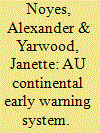

|
|
|
|
|
| Publication |
2013.
|
| Summary/Abstract |
Despite criticism from scholars, the Continental Early Warning System (CEWS) at the African Union (AU) has recently made significant progress in its capacity to monitor, analyse, and provide warning of impending conflict situations in Africa. However, CEWS remains constrained by human resource limitations, inchoate cooperation and information sharing with the early warning efforts of regional organizations, and unsystematic coordination with the various AU organs focusing on peace and security. Additionally, although the early warning-early response gap is narrowing at the AU, early response mechanisms continue to be constrained by limited capacity and issues of political will, as high-level political disagreements and issues of sovereignty militate against effective preventive action. Based on over two-dozen interviews with senior-level CEWS and AU officials, along with other relevant stakeholders, this paper highlights recent operational progress, identifies remaining gaps, and forwards policy options for the AU and international community to build on the gains of CEWS.
|
|
|
|
|
|
|
|
|
|
|
|
|
|
|
|
| 3 |
ID:
124414


|
|
|
|
|
| Publication |
2013.
|
| Summary/Abstract |
This article analyzes the Government of Canada's decision to lobby the North Atlantic Treaty Organization (NATO) to lead the International Security Assistance Force (ISAF) in Afghanistan in 2003. Although studies have been conducted on Canada's choice to deploy to Kandahar province, the decision to lobby NATO, and the diplomatic efforts that resulted, have been given little attention. In addition, Ottawa's decision to propose joint leadership of the mission with Germany in 2003 warrants further study. This article considers three key motivations evident in the Canadian government's thinking-first, its view of deployment to Afghanistan as an alternative to deployment to Iraq; second, its interest in developing relations with Germany; and finally, its more general motivation to return to the conflict.
|
|
|
|
|
|
|
|
|
|
|
|
|
|
|
|
| 4 |
ID:
124422
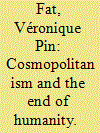

|
|
|
|
|
| Publication |
2013.
|
| Summary/Abstract |
The academic discipline of International Relations has yet to systematically begin tracing the impact of posthumanism on ethics in global politics. In a context where a humanist picture of the subject is in "a state of crisis that is more acute than ever," and the "end of humanity" is being declared by some, the question arises as to whether a moral commitment to liberal cosmopolitanism can be maintained. It arises because the moral commitments of cosmopolitanism traditionally rest on a humanist foundation, and posthumanism, at first glance, seems an obvious threat to it. In this article, rather than reading posthumanism as a threat to humanity, I read humanism as the threat. I propose that, tricky though it may be, a cosmopolitanism that embraces the end of humanity can be formulated and defended as a moral commitment to humanity: a cosmopolitanism without foundations. This cosmopolitanism without foundations is, I suggest, one way to overcome the skeptic's fantasy that we are hidden from each other, and with it the belief that our primary relation to the world is one of knowledge anchored to foundational promises of certainty. Instead, a life lived in the world with others is proposed, and with it a cosmopolitan commitment to humanity as an unavoidable ethical responsibility.
|
|
|
|
|
|
|
|
|
|
|
|
|
|
|
|
| 5 |
ID:
124384
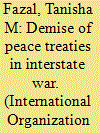

|
|
|
|
|
| Publication |
2013.
|
| Summary/Abstract |
The conclusion of peace treaties following war was a norm of international politics for millennia. Since approximately 1950, however, the rate at which interstate wars have ended with a formal peace treaty has declined dramatically. I argue that the costs of concluding peace treaties have risen with the development of the modern canon of the law of war. Using an original data set, I find that states today prefer to avoid admitting to a state of war and risk placing their leaders and soldiers at risk of punishment for any violations of the law of war.
|
|
|
|
|
|
|
|
|
|
|
|
|
|
|
|
| 6 |
ID:
124413
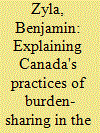

|
|
|
|
|
| Publication |
2013.
|
| Summary/Abstract |
While Canadian burden-sharing practices within NATO in the 1990s are well documented, the data in the literature raise two central questions: (1) was the practice of Canadian burden-sharing a one-time event, or was it part of a larger pattern of practices? and (2) what factors motivated Canada to shoulder the burden to the extent that it did? This article studies the extent of Canada's burden-sharing practices in the context of the International Security Assistance Force (ISAF) mission in Afghanistan. The article makes two arguments: first, Canada's commitment to NATO continued to be strong post-9/11; second, Canada's practices of sharing Atlantic burdens can be explained by its adherence to the norm of "external responsibility," which guided its foreign policy by appealing to Canada's humanitarian responsibilities to contribute at an extraordinary level to the promotion and maintenance of international peace and security.
|
|
|
|
|
|
|
|
|
|
|
|
|
|
|
|
| 7 |
ID:
124398
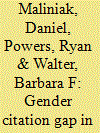

|
|
|
|
|
| Publication |
2013.
|
| Summary/Abstract |
This article investigates the extent to which citation and publication patterns differ between men and women in the international relations (IR) literature. Using data from the Teaching, Research, and International Policy project on peer-reviewed publications between 1980 and 2006, we show that women are systematically cited less than men after controlling for a large number of variables including year of publication, venue of publication, substantive focus, theoretical perspective, methodology, tenure status, and institutional affiliation. These results are robust to a variety of modeling choices. We then turn to network analysis to investigate the extent to which the gender of an article's author affects that article's relative centrality in the network of citations between papers in our sample. Articles authored by women are systematically less central than articles authored by men, all else equal. This is likely because (1) women tend to cite themselves less than men, and (2) men (who make up a disproportionate share of IR scholars) tend to cite men more than women. This is the first study in political science to reveal significant gender differences in citation patterns and is especially meaningful because citation counts are increasingly used as a key measure of research's quality and impact.
|
|
|
|
|
|
|
|
|
|
|
|
|
|
|
|
| 8 |
ID:
126162
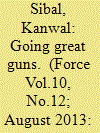

|
|
|
|
|
| Publication |
2013.
|
| Summary/Abstract |
In the last decade the biggest change in the complexion of our foreign relations has been with the US. The general attitude in India has become markedly positive towards the US. In return, bi-partisan support now exists in the US for enhanced ties with India, expressed at times with much rhetoric.
|
|
|
|
|
|
|
|
|
|
|
|
|
|
|
|
| 9 |
ID:
124788
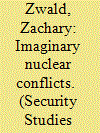

|
|
|
|
|
| Publication |
2013.
|
| Summary/Abstract |
Although the question of how policymakers arrive at their nuclear doctrine and force structure preferences is one of unparalleled importance, it has not received systematic attention in international relations. This article, therefore, develops and illustrates a behavioral model of nuclear deterrence preference formation wherein variation in such preferences is a function of the content and flexibility of one's theory-driven thinking. A policymaker determines the value of potential doctrine and force structure positions in the context of his or her beliefs about the nature of how nuclear conflict will likely begin and proceed-i.e., whether more as a result of rational and deliberate action or due to fear, misperception, and accident. This analysis challenges the dominant explanations of doctrine and force structure preference formation that are implicit in IR. It suggests how the dialogue of the deaf in domestic debates over nuclear weapons policy can be reduced in the future and provides new criteria by which to recast the proliferation optimist-pessimist debate.
|
|
|
|
|
|
|
|
|
|
|
|
|
|
|
|
| 10 |
ID:
125496
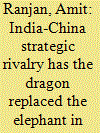

|
|
|
|
|
| Publication |
2013.
|
| Summary/Abstract |
Has China replaced or is an the process of "replacing" strategic presence of India in South Asia, is the most pertinent question, which keeps the Indian strategic community busy. It is known fact that since ancient time South Asia, as a region, had been under the influence of India; but things change since beginning of the Cold War.
|
|
|
|
|
|
|
|
|
|
|
|
|
|
|
|
| 11 |
ID:
126972
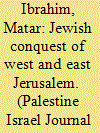

|
|
|
|
|
| Publication |
2011.
|
| Summary/Abstract |
The article highlights the history of Jerusalem in 1948-1967. It mentions the conquest of Jerusalem by the Jewish forces which resulted in uprooting and displacing the indigenous Christian and Muslim Palestinian population from West Jerusalem. It also mentions the 1967 Israeli invasion and colonization of Arab Jerusalem.
|
|
|
|
|
|
|
|
|
|
|
|
|
|
|
|
| 12 |
ID:
125250
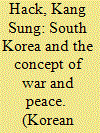

|
|
|
|
|
| Publication |
2013.
|
| Summary/Abstract |
does Confucianism account for any part of the perceptions of international politics that Korean possess? if it does, then how significant has its influence been on the historical process of the conceptual formation of Korean's concepts of war and peace? first learned over two millennia ago, Confucianism finally become the sole ruling ideology under the Joseon Dynasty. Ever since, Confucian virtues moralistic approach, education of men, and family like international order with the middle kingdom at the centre, among many played dominant roles in Korean domestic politics as well as it foreign relations (Sino-Korea relations, almost exclusively). what seemed to last forever in East Asia, however confronted a massive challenge an the fate of Koreans was not exception. Korea's bandwagoing strategy within the Confucian world order could not function nay more with the advent of the age of imperialism and the subsequent foreign penetrations.
|
|
|
|
|
|
|
|
|
|
|
|
|
|
|
|
| 13 |
ID:
126719
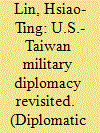

|
|
|
|
|
| Publication |
2013.
|
| Summary/Abstract |
This article seeks to retrace the making of the 1954 U.S.-Taiwan military alliance and shed new light on the Taiwanese perception of the issue. As will be revealed, the conclusion of the 1954 defense treaty between Washington and Taipei was not only a result of the American Cold War strategy in the Far East, as the numerous existing historical literature have admirably depicted. It was also a representation of Chiang Kai-shek's sophisticated military diplomacy, involving the role of a hitherto little-known group of Japanese then serving as his "unofficial" advisors. New historical evidence also suggests that, in this military diplomacy, Chiang played with the United States, for signing a defense pact was originally not one of his priorities. Rather, what Chiang had initially sought from America was the means by which to rearm his forces so as to strengthen his position to launch a military recovery of the mainland.
|
|
|
|
|
|
|
|
|
|
|
|
|
|
|
|
| 14 |
ID:
124383
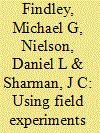

|
|
|
|
|
| Publication |
2013,
|
| Summary/Abstract |
Efforts to fight international money laundering, corruption, and terrorist financing depend crucially on the prohibition barring the formation of anonymous shell companies+ To study the effectiveness of this prohibition, we perform the first international relations ~IR! field experiment on a global scale+ With university institutional review board ~IRB! clearance, we posed as consultants requesting confidential incorporation from 1,264 firms in 182 countries+ Testing arguments drawn from IR theory, we probe the treatment effects of specifying ~1! the international standards ~managerialism!, ~2! penalties for noncompliance with these standards ~rationalism!, ~3! the desire to follow norms through complying with international standards
|
|
|
|
|
|
|
|
|
|
|
|
|
|
|
|
|
|
|
|
|